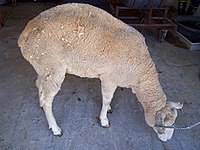
Photo from wikipedia
The origin of chronic wasting disease (CWD) in cervids is unclear. One hypothesis suggests that CWD originated from scrapie in sheep. We compared the disease phenotype of sheep-adapted CWD to… Click to show full abstract
The origin of chronic wasting disease (CWD) in cervids is unclear. One hypothesis suggests that CWD originated from scrapie in sheep. We compared the disease phenotype of sheep-adapted CWD to classical scrapie in sheep. We inoculated sheep intracranially with brain homogenate from first-passage mule deer CWD in sheep (sCWDmd). The attack rate in second-passage sheep was 100% (12 of 12). Sheep had prominent lymphoid accumulations of PrPSc reminiscent of classical scrapie. The pattern and distribution of PrPSc in the brains of sheep with CWDmd was similar to scrapie strain 13-7 but different from scrapie strain x124. The western blot glycoprofiles of sCWDmd were indistinguishable from scrapie strain 13-7; however, independent of sheep genotype, glycoprofiles of sCWDmd were different than x124. When sheep genotypes were evaluated individually, there was considerable overlap in the glycoprofiles that precluded significant discrimination between sheep CWD and scrapie strains. Our data suggest that the phenotype of CWD in sheep is indistinguishable from some strains of scrapie in sheep. Given our results, current detection techniques would be unlikely to distinguish CWD in sheep from scrapie in sheep if cross-species transmission occurred naturally. It is unknown if sheep are naturally vulnerable to CWD; however, the susceptibility of sheep after intracranial inoculation and lymphoid accumulation indicates that the species barrier is not absolute.
Journal Title: Journal of Veterinary Diagnostic Investigation
Year Published: 2021
Link to full text (if available)
Share on Social Media: Sign Up to like & get
recommendations!